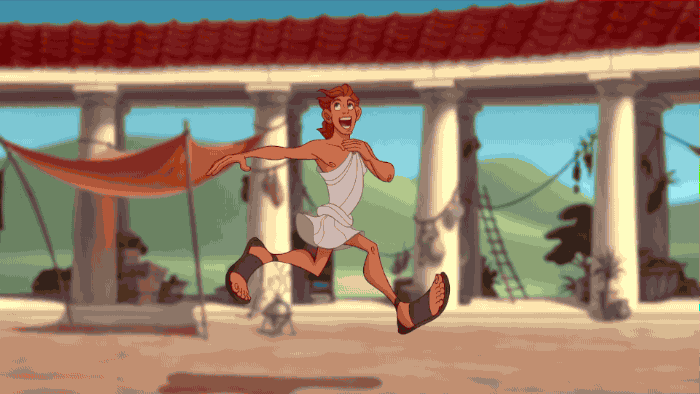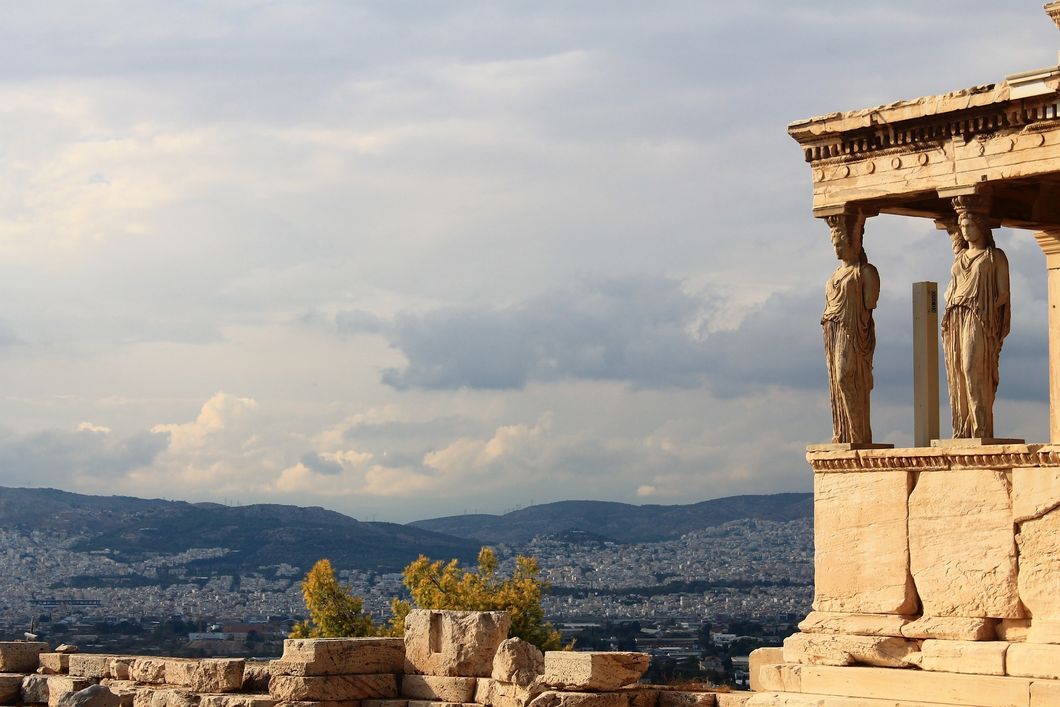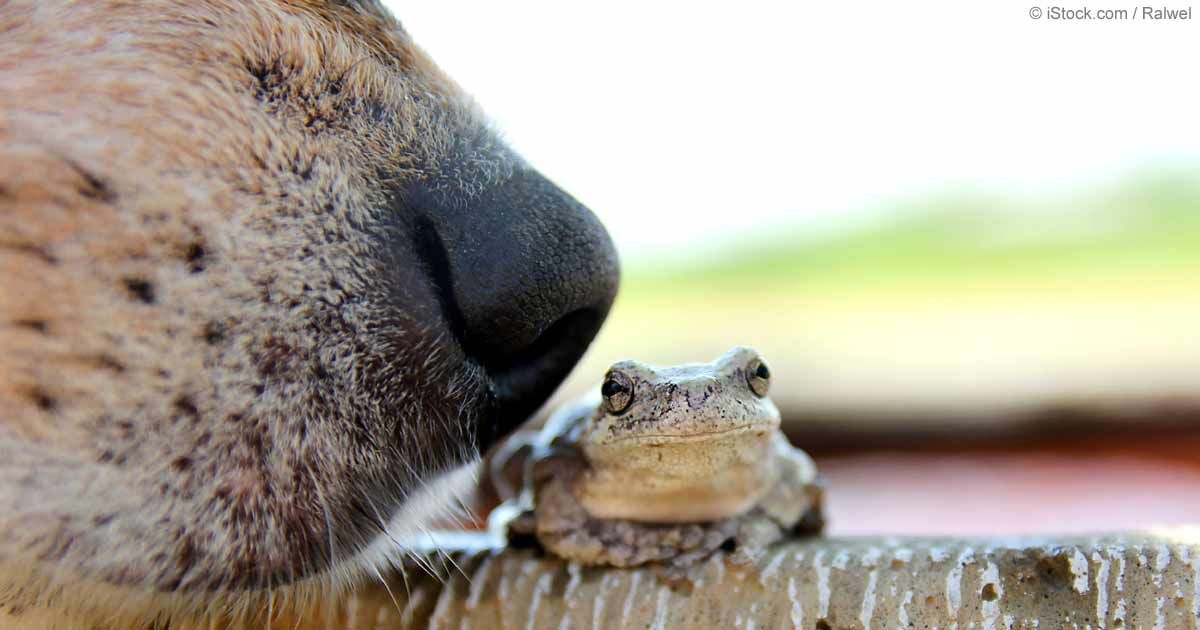I've taken a few Classics classes since coming to college, and I enjoyed them so much I added a Classical Studies minor to my plan of study! I've always been interested in myth and the stories about gods and goddesses, so last semester I took a class on Greek and Roman mythology. We talked about a lot of things that are somewhat considered common knowledge, but I also learned about a ton of stories I hadn't heard before, as well as new views on various things I already knew.
I went back through my notes and compiled a brief list of my favorite and sometimes surprising facts!
The three main gods were assigned their realms by luck.
Zeus, Poseidon, and Hades drew lots to determine their kingdoms. Zeus got the skies and the heavens, Poseidon the land, and the sea, and Hades the underworld. Their powers just so happen to align with their kingdoms, or these details were chosen to make sense in the story.
In iconography, the big three are only distinguished through the details.

Depending on what was in his hand, this could be Poseidon or Zeus.
A grown man with a beard and long, flowy hair could be any of the three, depending on what he is shown with. Zeus is seen with a thunderbolt, Poseidon his trident, and Hades with either Cerberus (the three-headed dog) or his wife Persephone, or the cornucopia.
Poseidon is well known for being the god of the seas, but he was actually given dominion over both the land and the seas.
Homer, an ancient poet whose writings preserved much of mythology, may have not actually been a single person.
The different writings are written in a similar fashion, so historians group them together as being written by a single person.
Many names of gods and titans in mythology became reference names of the places themselves.
Hades, Tartarus, Oceanus, etc.
The titan Cronus devoured each of his children (the Olympians) as they were born.

Saturn Devouring His Son by Francisco de Goya
Rhea, their mother, deceived her husband and disguised a rock as the youngest child, saving young Zeus' life. Sometime later he returned and forced his father to release his siblings who were still alive inside of him.
While Cronus is viewed as a bad guy in Greek mythology, his Roman counterpart Saturn is actually seen as a god of wealth and prosperity.
Succession myth: Cronus defeated Uranus, Zeus defeated Cronus...
This supposed curse on the family line spooked Zeus so much that he killed his first wife Metis to avoid having a child that would destroy him.
Athena's birth was quite different from that of her siblings: she was the result of a headache.
Zeus was afraid that his child would be his destruction–due to a prophecy that said just that–so he ate his lover when he found out she was pregnant. The fetus then became a part of him, and one day she popped out of his forehead, fully grown and dressed for battle.
The constellation Aquarius is sometimes associated with Ganymede, Zeus' personal cupbearer.
Zeus fell in love with the young mortal prince's beauty and kidnapped him while disguised as an eagle. He took him to Mt. Olympus and made him immortal. Ganymede is also the name of Jupiter's largest moon, and Jupiter is named for the Roman counterpart to Zeus.
Pandora's "box" was actually a jar that was opened and let out all of the evil in the world.
Supposedly, whoever originally translated the ancient texts mistranslated the word pithos, but the term "Pandora's box" had already caught on. Pandora was also created as an additional punishment for Prometheus who stole fire from Mt. Olympus, making women be the original source for pain and suffering.
Poseidon and Athena were bitter enemies.

They fought to be the patron god or goddess of Athens. Poseidon provided the city with the harbor, but the salt water was not safe to drink. Athena gave the olive tree, which provided food, wood, and oil. You can guess who won.
The 12 Olympians often differ, and Hades is not included.
The 12 Olympians consist of Zeus, Demeter, Hera, Poseidon, Hestia, Hermes, Aphrodite, Ares, Hephaestus, Apollo, Athena, and Artemis. In some lists, Dionysus replaces Hestia. Hades does not live on Mt. Olympus, therefore he is not an Olympian.
Aphrodite is the eldest of the Olympians.
She was the result of the castration of Uranus by Cronus. His severed genitals landed in Pontus (the sea) and out of the foam came the goddess of love. She is credited as being Zeus' daughter, but then origin story makes her much older than him, technically his great-aunt. This plays into the idea that the Greeks were not too concerned about their timelines making a lot of sense.
Cupid is the Roman counterpart to Eros. While often depicted as a baby and known as Aphrodite's son, Eros was a primordial being.
Depending on the story, he is either the goddess of love's son, lover, or ancestor.
Hermaphroditus, the son of Aphrodite and Hermes, is where we get the word 'hermaphrodite,' (obviously).
He was an incredibly beautiful young man, sought after by many women. One, a woman named Salmacis, fell in love with him but he refused her. She chased after him and clung so tightly to him that the two became one. Hermaphroditus is shown in iconography as being both male and female.
Another child of Aphrodite, Priapus, is the origin story for garden gnomes.
It is not known for sure whether Priapus is the son of Dionysus or Hermes, but he is always shown as having a "comically large phallus," as my professor put it. Little statues of him were used to ward off intruders and bless the fertility of one's garden.
The Cyclopes are the skillful smiths who forged various important weapons.
This includes Zeus' lightning bolts and Poseidon's famous trident.
Because Zeus was quite unfaithful to his wife (and sister) Hera, he came up with various disguises in an attempt to hide his infidelity.
Some of his transformations included an eagle, a bull, a dove, and even a "shower of golden light."
The seasons exist because of Hades taking Persephone to the Underworld.
Once taken there, she ate a pomegranate, making her unable to ever leave for good. Instead, she was permitted to leave and be with her mother (Demeter) for part of the year–summer and spring–and must spend the rest of the year with Hades, in fall and winter.
Another odd birth of one of Zeus' many offspring is Dionysus.
His mother was Semele, a mortal woman who slept with Zeus and then asked to see him in all of his divine glory. Because she was a mere human, his godliness caused her to burst into dust. Zeus saved the unborn child and stitched into his thigh, from which Dionysus eventually leaped.
Hercules is actually the Roman hero. His Greek counterpart is called Heracles.

Hera actually wasn't Heracles/Hercules' mother, despite the meaning of his name ("glory of Hera").
In fact, she is actually the one who sent the snakes to kill him when he was a baby, not Hades like in the Disney animation.
The origin story for the Milky Way comes from Heracles and Hera.
Even though she despised him, she tried to breastfeed her husband's child. Heracles bit her breast and milk sprayed into the heavens. Thus, the Milky Way.
Tartarus is the deepest, most terrible part of the Underworld/Hades.
The Titans, Tantalus, and Sisyphus are the inhabitants. Tantalus served his son as the meal at a dinner feast and is eternally punished with unquenchable hunger and thirst. Sisyphus was a wicked king who was punished by having to push a boulder up a hill over and over again, forever. These punishments were because both men violated xenia, the proper treatment of guests and strangers, one of the most sacred ideals in Ancient Greece.




















 sunrise
StableDiffusion
sunrise
StableDiffusion
 bonfire friends
StableDiffusion
bonfire friends
StableDiffusion
 sadness
StableDiffusion
sadness
StableDiffusion

 purple skies
StableDiffusion
purple skies
StableDiffusion

 true love
StableDiffusion
true love
StableDiffusion
 My Cheerleader
StableDiffusion
My Cheerleader
StableDiffusion
 womans transformation to happiness and love
StableDiffusion
womans transformation to happiness and love
StableDiffusion
 future life together of adventures
StableDiffusion
future life together of adventures
StableDiffusion





















